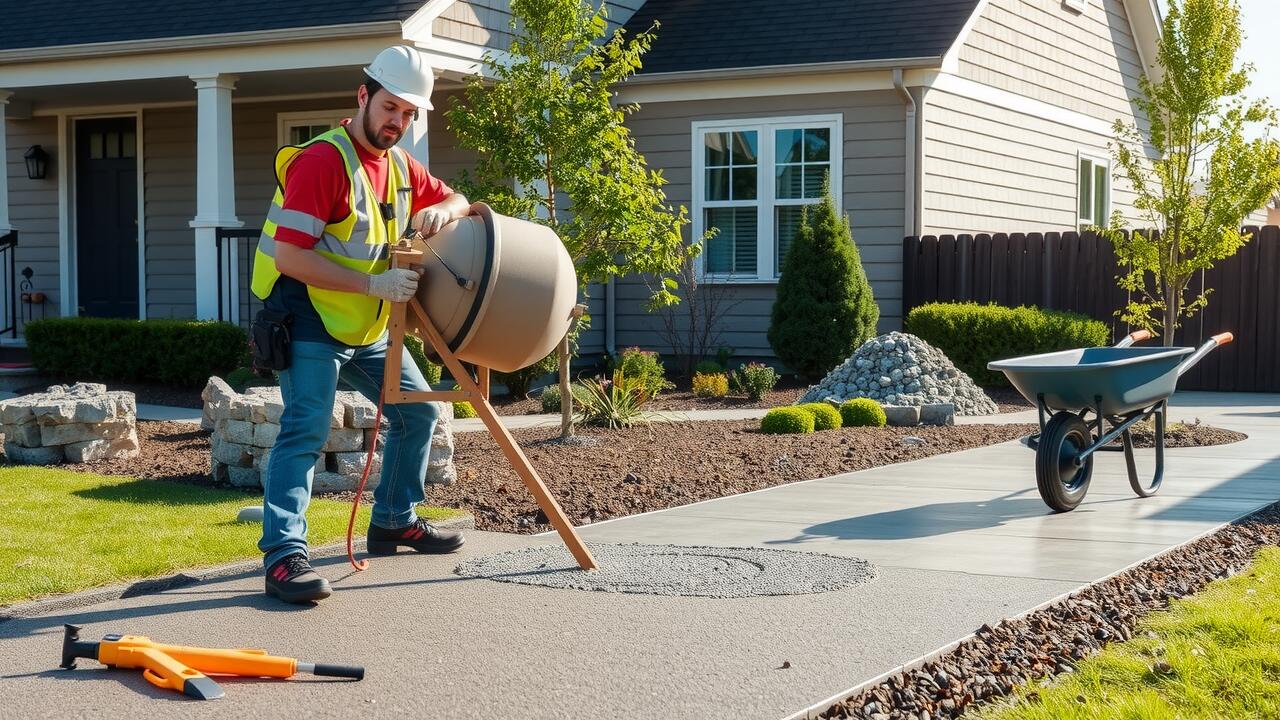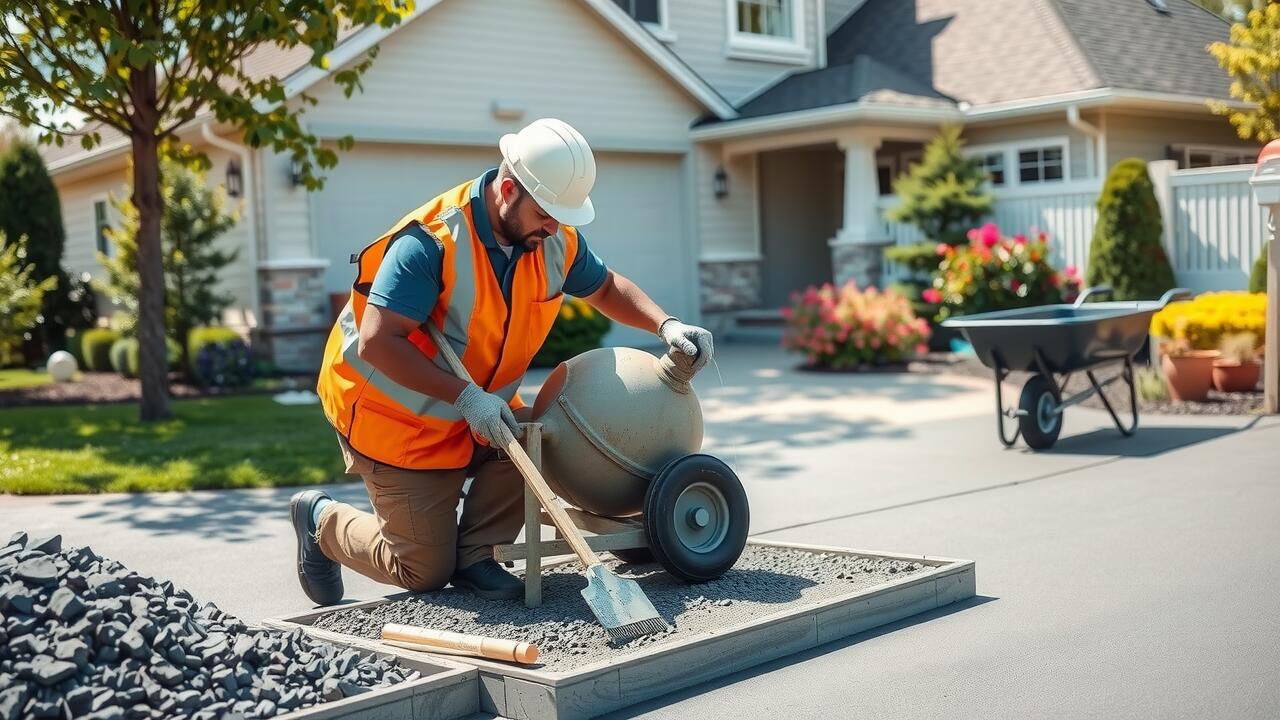
Aesthetic Considerations
Aesthetic considerations play a significant role in choosing materials for driveway installation. Asphalt offers a sleek, uniform appearance that many homeowners appreciate. Its dark hue can create a modern look while also providing a safe, non-slip surface. However, asphalt lacks the extensive customization options available with concrete. Concrete can be stamped, stained, and colored, allowing for a wide range of designs that enhance curb appeal.
The visual appeal of each material can influence property value. A well-installed concrete driveway can give a home a sophisticated look, potentially attracting buyers who prioritize aesthetics. In contrast, while asphalt is often seen as more utilitarian, it can be treated with sealants to improve appearance and extend longevity. Ultimately, the choice between asphalt and concrete for driveway installation heavily depends on individual preferences and the desired outcome for visual impact.
Visual Appeal and Customization Options
Asphalt and concrete offer distinct visual aesthetics that can influence the choice for driveway installation. Asphalt provides a dark, smooth surface that complements a wide range of architectural styles. Its clean look can create a polished appearance while being practical for various environments. By contrast, concrete can be more versatile in terms of customization. Homeowners can choose from different finishes, textures, and colors, allowing for decorative patterns and designs that enhance curb appeal.
In terms of customization options, concrete often stands out due to its ability to mimic other materials such as brick or stone. This versatility makes it an attractive choice for those wanting a unique driveway installation that reflects personal taste. Additionally, the use of stamped or stained concrete adds another layer of visual interest. While asphalt is less adaptable in terms of design, its uniformity can still appeal to those seeking a traditional look with minimal maintenance.
Installation Timeframes
Installation timeframes for asphalt and concrete differ significantly. Asphalt driveways can be installed relatively quickly, often completed within a day or two. This speed is appealing for homeowners wanting immediate use of their driveways. The process involves laying down a heated mixture that solidifies rapidly, allowing for faster application and fewer delays.
Concrete driveways typically require a longer installation process. The curing time can extend from several days to weeks, depending on weather conditions and thickness. This extended timeframe can be a disadvantage for those in need of swift driveway installation. The need for careful handling during the curing phase ensures that the surface cures properly and achieves optimal strength.
Speed of Construction for Each Material
Asphalt is often favored for driveway installation due to its quicker application process. The material can be laid down in a matter of hours, allowing homeowners to have a functional surface in a relatively short time frame. The curing process for asphalt is also faster compared to concrete, which means it can be driven on sooner. This rapid installation makes asphalt an attractive option for those looking to complete a project swiftly.
In contrast, concrete requires more time to set adequately before it can be used. Driveway installation with concrete typically involves longer curing times, which can delay access to the finished surface. Homeowners must account for these additional days when planning their project. While concrete offers durability, the extended timeframe can be a significant factor in choosing between the two materials.
Performance in Different Climates
When considering performance in different climates, both asphalt and concrete have their advantages and drawbacks. Asphalt is generally more flexible, allowing it to expand and contract with temperature changes without cracking. This characteristic makes it a favorable option in regions with fluctuating weather, where heavy rainfall and thawing snow can put stress on surfaces. Driveway installation using asphalt can often withstand these conditions better than concrete, which may suffer from freeze-thaw cycles that lead to surface damage.
Concrete, on the other hand, tends to perform better in extremely hot climates. Its light color helps reflect sunlight, which can reduce heat absorption compared to dark asphalt. However, concrete is more susceptible to cracking in extreme cold temperatures, particularly if not properly cured or sealed. In environments with intense winters, the need for regular maintenance is essential for both asphalt and concrete driveways to ensure longevity. Choosing the right material involves evaluating local climate patterns alongside aesthetic and budgetary considerations.
Suitability for Extreme Weather Conditions
Both asphalt and concrete have characteristics that influence their performance in extreme weather conditions. Asphalt is known for its flexibility, allowing it to withstand freeze-thaw cycles better than concrete. This flexibility can prevent cracking during harsh winters, making it a preferred choice in regions prone to severe cold and snow. On the other hand, concrete tends to be more resilient in extremely hot climates, as it can withstand high temperatures without warping or deforming.
In areas that experience heavy rainfall, asphalt’s water-resistant properties can be advantageous, as it tends to shed water more effectively than concrete. However, this can lead to pooling if not installed properly during Driveway Installation. Concrete offers superior durability and low maintenance in such climates but may require sealing to prevent water from penetrating and causing damage over time. Each material has its merits depending on the specific environmental challenges faced, affecting the choice for Driveway Installation based on climate considerations.
FAQS
Is asphalt generally cheaper than concrete?
Yes, asphalt is typically less expensive than concrete in terms of initial material costs and installation.
What are the main aesthetic differences between asphalt and concrete?
Asphalt usually has a darker color and a smoother finish, while concrete can be customized with various textures, colors, and patterns to enhance its visual appeal.
How does installation time differ between asphalt and concrete?
Asphalt installations are generally quicker than concrete, as asphalt can be laid and cured in a shorter period, allowing for faster use of the surface.
Which material performs better in extreme weather conditions?
Concrete tends to perform better in extremely hot climates as it is less susceptible to softening, while asphalt can be more durable in cold climates due to its flexibility.
Are there long-term maintenance costs associated with asphalt compared to concrete?
Yes, asphalt typically requires more frequent maintenance, such as sealing and patching, which can add to its overall long-term costs compared to concrete, which is generally more durable and requires less upkeep.
